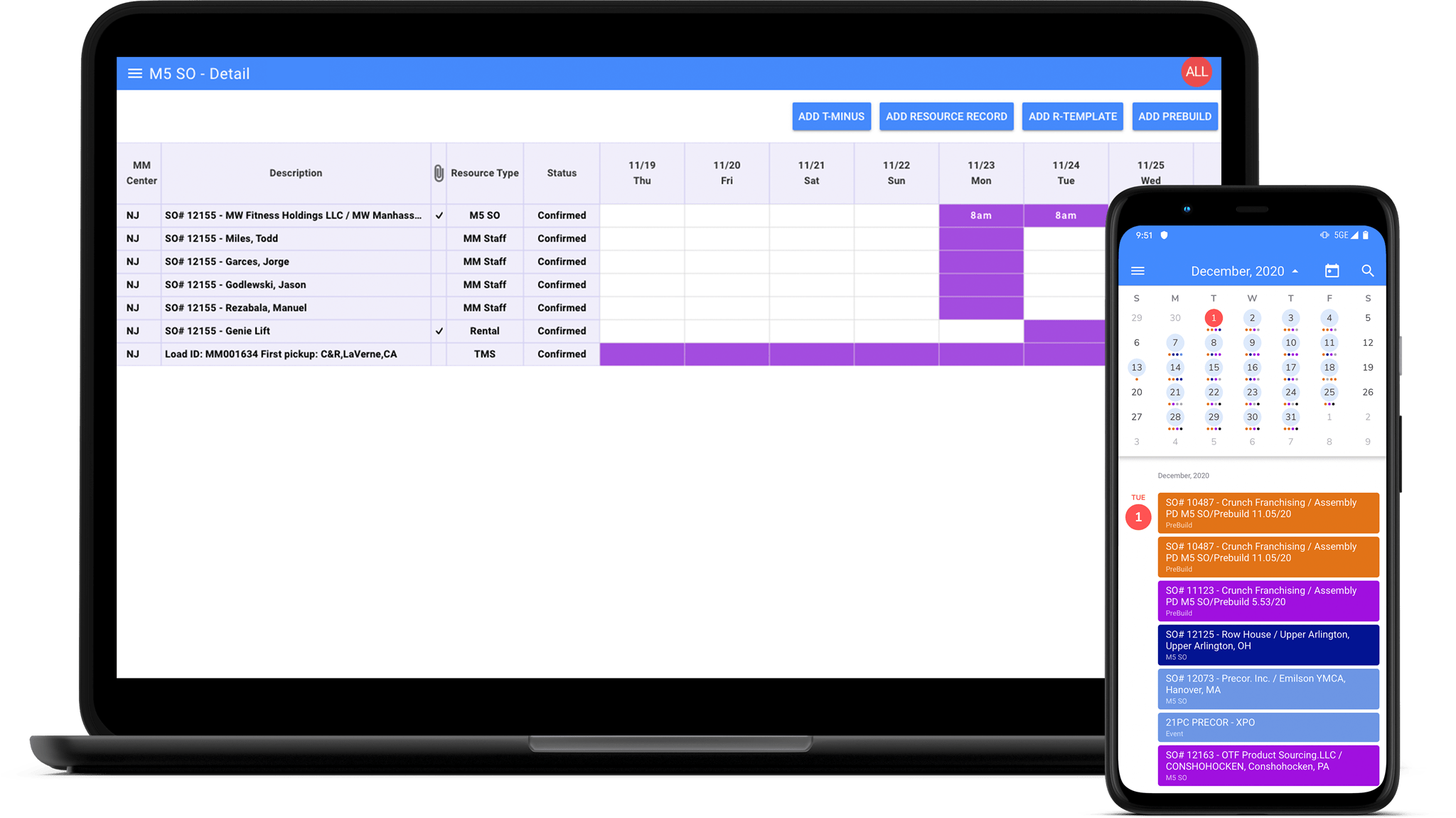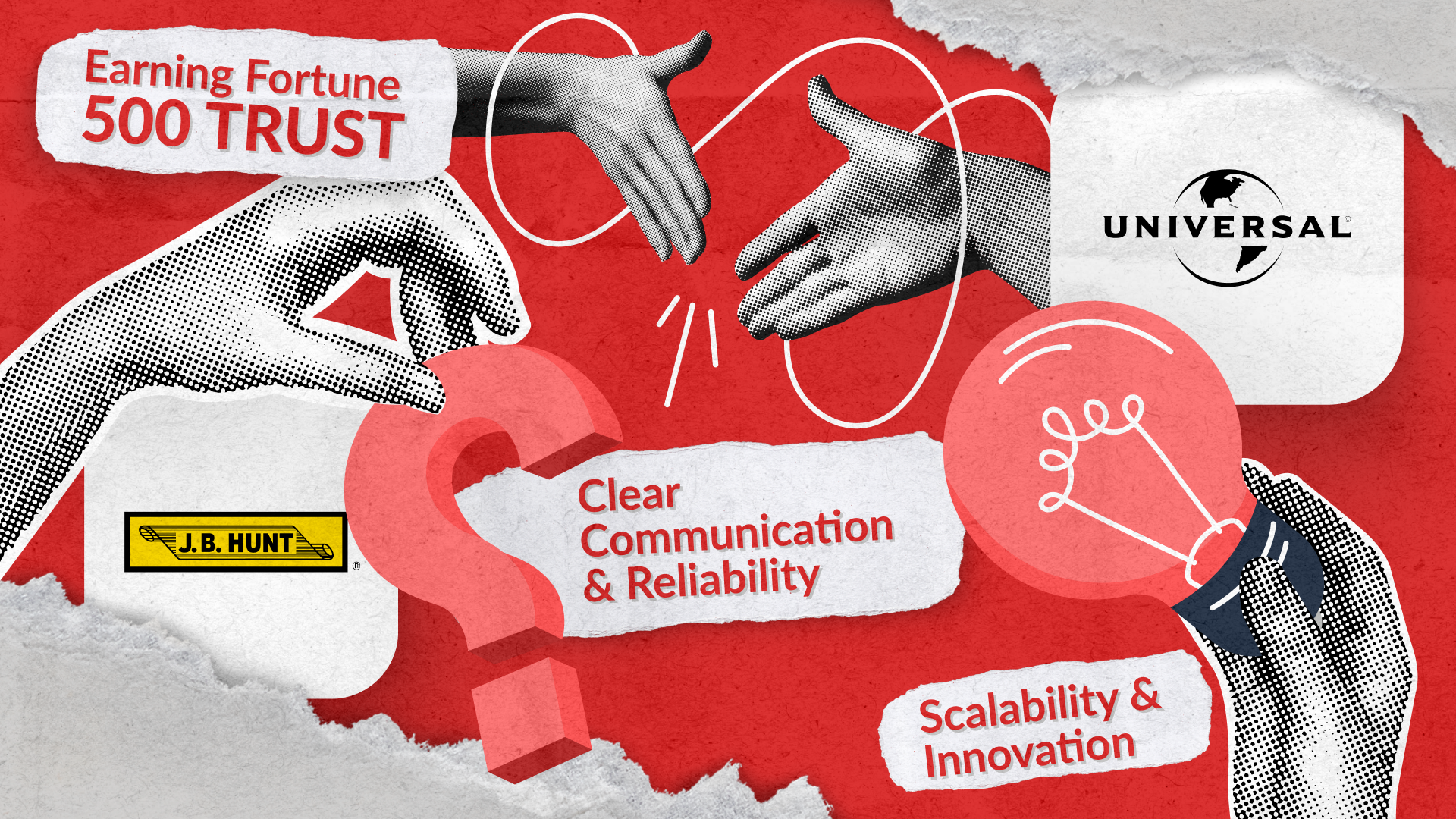Working with Fortune 500 clients often feels like being behind the scenes in a closed kitchen, where the real action happens out of sight. In this article, we’re opening the door and sharing what it truly takes to earn their trust and deliver results. These organizations operate on massive scales, have complex hierarchies, and demand not just technical skill, but process maturity. Having worked with Fortune 500 companies like Universal Music and J.B. Hunt (through their acquisition of Mass Movement), we know how to make enterprise collaboration work for everyone involved.
Understand Their Ecosystem
Fortune 500 companies don’t move fast, but they move deliberately. Working with them means navigating an ecosystem where legal, procurement, IT, and business stakeholders all have a say. Expect overlapping interests and evolving priorities.
To cut through the noise, become a student of their business. When we worked with Mass Movement, a logistics provider later acquired by J.B. Hunt, we immersed ourselves in the daily workflows of drivers, dispatchers, and warehouse teams. The result? A suite of web and mobile apps that automated operations and earned trust from both field and executive teams.
Map out the stakeholder chain early. Align deliverables with each decision-maker’s priority to reduce friction.
Think Long-Term, Not Transactional
Big enterprises don’t want a one-off code delivery—they want reliability. A vendor can ship features. A partner fixes problems before they happen.
When Universal Music approached us to revamp their legacy music recommendation app, the task went beyond fixing bugs. The C# & .NET codebase was fragile, the requirements vague, and the launch deadline non-negotiable. We cleaned up legacy code, set up deployment environments, integrated analytics, and still delivered on time.
Focus on being the team they can rely on when things go sideways. That’s how one project becomes three.
Speak Enterprise Without Jargon
Fortune 500 companies aren’t looking for fancy language. They just want to know what you can actually achieve for them. Learn their lingo but avoid buzzword bingo. What matters is ROI, stability, maintainability, and compliance.
Use tools that support documentation and reporting (Confluence, Jira, Notion). Avoid assumptions—if a requirement is unclear, confirm it twice.
Weekly updates, sprint demos, and upfront risk flags go further than polished decks.
Scale Isn’t Optional—It’s the Baseline
Enterprise software doesn’t live in a sandbox. It integrates with ERPs, interacts with CRMs, and often serves thousands of users across multiple regions. Your architecture needs to handle that on day one.
At Redwerk, our work with Mass Movement included building five different apps and internal tools, all of which were synced for real-time operations. From resource planning to inventory management, each app was built for specific roles and use cases, with zero downtime.
Checklist for Future-Ready Scalability:
- Design with multi-region traffic in mind
- Build infrastructure health dashboards
- Include load testing in your QA pipeline
- Version your APIs to support legacy systems
When your business starts to grow, you’ll see more people coming in. The real challenge is maintaining reliability, even when unexpected problems arise.
Balance Innovation With Enterprise Caution
Enterprises crave innovation but hate risk. Every new tech choice must have a fallback. That’s why we favor proven frameworks and extensible architectures.
While upgrading Universal Music’s app, we didn’t chase the latest hype. Instead, we reinforced the app’s core, added modularity for future integration with platforms like Spotify, and regression-tested every update before rolling it out.
Introduce innovation in layers. Make rollback plans part of every proposal.
Understand Procurement and Legal Realities
Contractual red tape is part of the process. From Non-Disclosure Agreements (NDAs) to data compliance clauses and Service Level Agreement (SLA) expectations—nothing gets overlooked. Don’t fight it. Get ready for it.
Have your legal team review Master Service Agreements (MSAs). Make sure you’re prepared with solid data handling protocols and clear General Data Protection Regulation (GDPR) compliance statements. Be ready with data handling protocols and GDPR-compliance statements. Anticipate questions around cloud usage, IP ownership, and security posture.
Build templates in advance. It saves weeks.
Deliver What Others Won’t
Most agencies want low-risk, clear-cut projects. But Fortune 500s often come with messy systems and half-baked documentation. Step in where others hesitate.
That’s how we helped Universal Music. The app had legacy tech, incomplete specs, and a ticking clock. We didn’t flinch—we delivered.
Big companies don’t care if things are perfect. Such enterprises want to know that you can get the job done, even when you’re under pressure.
Think in Versions, Not Just Releases
You’re not just building something for one delivery. You’re creating a product that’s meant to last and keep improving. That means thinking about feature deprecation, documentation handoffs, and support tickets before the client does.
Future-proofing starts with architecture. But it lives and dies with your documentation, test automation, and CI/CD. Make it painless to update, rollback, and expand.
Build systems that outlast your contract.
A Few Lessons Learned
- Initiative stands out. Fortune 500 teams value proactive communication and risk awareness.
- Predictability matters. Avoid scope creep and always clarify timelines.
- Feedback loops are gold. Stakeholders rarely say everything upfront. Read between the lines.
- Partnership mindset wins. Become an extension of their internal team, not just a vendor.
When It Pays to Think Small
Working with giants doesn’t mean you need a 200-person bench. It means showing up with lean expertise, structured communication, and a get-it-done mindset.
Just like we did for Universal and J.B. Hunt.
Want to see how we build software that scales for the world’s biggest companies? Let’s talk software.
Learn how we helped Mass Movement streamline fitness equipment logistics with 5 custom BPA apps—boosting efficiency and paving the way for acquisition by J.B. Hunt.



